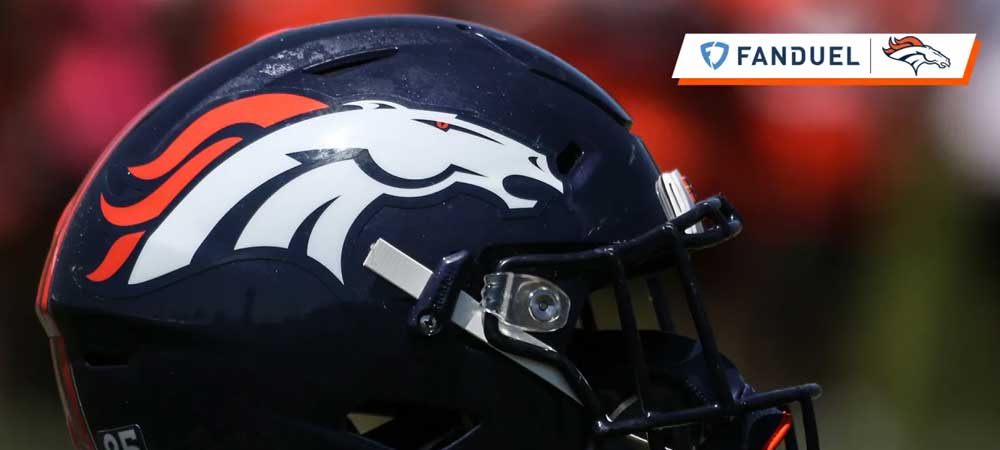- The Denver Broncos and FanDuel have signed the NFL’s first sports betting partnership.
- Colorado is quickly becoming a hotbed of online sports betting in the United States, so this move could help FanDuel establish a foothold as the state’s premier provider.
- Other NFL teams have already begun exploring such partnerships; the Washington Redskins even want to integrate an in-house sportsbook into their next stadium, wherever it may be located.
- The odds the NFL forgoes their previous staunch anti-gambling stance for many decades looks more positive, as many of the league’s founders were avid gamblers.
DENVER – On Monday afternoon, the Denver Broncos announced a multi-year sports betting and daily fantasy partnership with FanDuel. This partnership will be the first of its kind in the NFL.
The partnership is primarily a branding one, as FanDuel will be allowed to use the Broncos logo in all marketing materials in Colorado.
The company will also be allowed to advertise through every Broncos platform—television, radio, and digital—and through a limited amount of signage inside and outside of Empower Field at Mile High Stadium.
The deal is not exclusive, so the Broncos are free to sign partnerships with other sports betting and daily fantasy sports companies as well.
Colorado launched sports betting on May 1, 2020 and collected over $23 million in sports betting revenue in its first month of operation alone.
FanDuel is one of a handful of sports betting firms in Colorado already operating, but the partnership with the Broncos gives FanDuel an inside track on its competitors.
What The FanDuel-Broncos Partnership Means For The NFL
Although the NFL has held a hardline stance against sports betting for decades, that stance has begun to soften in recent years as public opinion of sports betting has improved.
The Broncos are the first team to sign a sports betting partnership, but other teams have also explored the concept.
The Washington Redskins, for example, have made sports betting a primary focus while exploring sites for their next stadium.
The team has lobbied Maryland legislators heavily to change sports betting laws, and neighboring Virginia recently amended its own sports betting laws to allow major league sports franchises to host in-stadium sportsbooks.
The obvious conclusion is that this provision is an attempt to lure the Redskins to Virginia.
The Indianapolis Colts also already have a deal in place with FanDuel, although that deal is exclusively related to daily fantasy sports for time being.
As the most valuable sports business in the world, the NFL is naturally going to be cautious about integrating sports betting into its business model, but the league has never been shy about maximizing revenue streams however possible.
By the end of the decade, it wouldn’t be shocking to see several NFL teams with sportsbooks integrated into their stadiums.
The History And Evolution Of The NFL And Sports Betting
Despite the league’s reluctance to embrace sports betting, the NFL actually has a long history with sports betting, starting with its founders.
Tim Mara, the founder of the New York Giants, was a bookmaker before he was an NFL owner, and used his gambling profits to fund the team for many years until the NFL became consistently profitable.
Art Rooney, the founder of the Pittsburgh Steelers, was an avid and knowledgeable bettor on horse racing and once made $300,000 in just two days of betting.
Bert Bell, founder of the Philadelphia Eagles and longtime NFL commissioner, grew up as a Pennsylvania socialite who would frequently bet (and lose) staggering sums of money on horse races.
The NFL did not have any official stance on sports betting until two Giants players, Frank Filchock and Merle Hapes, were offered $2,500 by a bookmaker to throw the 1946 NFL Championship game. Neither player accepted the money, but they did not report the offer to Tim Mara either.
When the story leaked, it was a black mark on the integrity of NFL competition, and despite his own history with gambling, optics forced Bert Bell to suspend both Filchock and Hapes. The NFL was still a fledgling league at the time, and it could not afford public sentiment to turn against it.
As the nation’s collective opinion of gambling became less favorable throughout the 20th century, the NFL maintained a consistent distance from the sports betting industry.
Flash forward to today, however, and the NFL is no longer a fledgling league but a titan of global sports businesses. Likewise, sports betting is now an open and regulated industry in many states.
The league is still being cautious about partnering with an industry that was illegal in most states for so long, but a connection with the gambling industry is no longer the black mark it once was.
Major soccer franchises all over the world have signed sports betting partnerships, with many even taking on sports betting companies as their primary jersey sponsors. Partnerships with legal and regulated sports betting providers look like they will play a prominent role in the future of sports.
In addition, a gambling controversy for the NFL would be almost quaint compared to the ongoing PR saga of the link between football and chronic traumatic encephalopathy (CTE), a neurodegenerative disease that has been linked to cranial impacts that are frequent on a football field.
Sports betting is primed to be a lucrative industry in the United States for decades to come, so the benefits of legal sports betting partnerships seem to far outweigh any potential drawbacks for the NFL.
Expect more teams to follow in the Broncos’ footsteps in the coming years.
Advertising Disclosure
In order to provide you with the best independent sports betting news and content LegalSportsBetting.com may receive a commission from partners when you make a purchase through a link on our site.
News tags: Art Rooney | Bert Bell | Colorado | CTE | Denver Broncos | Empower Field | Empower Field at Mile High Stadium | FanDuel | Indianapolis Colts | Maryland | Mile High Stadium | New York | New York Giants | NFL | Pennsylvania | Philadelphia Eagles | Pittsburgh Steelers | Tim Mara | Virginia | Washington Redskins

With a dual background in English and sports performance and business analytics, Carter aims to write stories that both engage and inform the reader. He prides himself on his ability to interweave empirical data and traditional narrative storytelling. When he isn’t keeping readers up to date on the latest sports betting legal news, he’s banging his head against a wall regretting his decision to be a Tampa Bay Buccaneers fan.


 Bitcoin Sports Betting Sites
Bitcoin Sports Betting Sites Best Online Sports Betting
Best Online Sports Betting Famous Sports Bettors
Famous Sports Bettors States With Legal Sports Betting
States With Legal Sports Betting Sports Betting Events
Sports Betting Events




